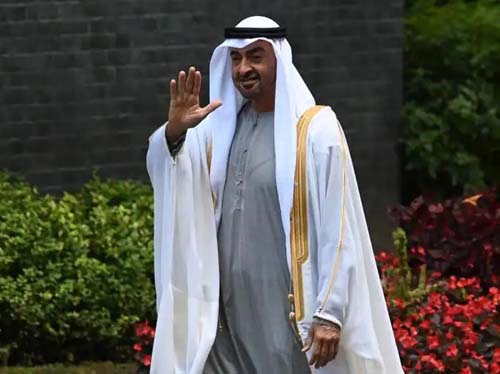
UAE’s prince of hearts a trailblazer for the region
Ibrahim Shukralla
In 2017, a man showed up at the White House dressed in a white thawb and ghutra and an off-white bisht, exchanging smiles and shaking hands with the president of the most powerful country in the world, the US. Two years later, The New York Times labeled the same man “the most powerful Arab ruler.” His name is Sheikh Mohammed bin Zayed Al-Nahyan and last Saturday he became president of the UAE.
With his outlook, fluency in English and Arabic, top-notch body language and strong diplomatic, political and leadership skills, he embodies what he wants the UAE to be: Proudly Arab, yet forward-thinking and modern.
From hosting Pope Francis in the first ever visit by a pontiff to the Arabian Peninsula to signing pacts with the presidents of Russia, Brazil, Turkey and China and the prime ministers of Arab, Asian and Western countries and meeting thought leaders, scholars from various religions, sporting figures, iconic disabled figures and artists, Sheikh Mohammed, who is known as MBZ, wants his country to be an oasis of tolerance and inclusiveness and a solid business and moderate diplomacy hub.
Sheikh Mohammed, who succeeded his half-brother, Sheikh Khalifa bin Zayed Al-Nahyan, as president of the Gulf country, is known for his bold decisions that challenge the status quo, while maintaining the fundamentals established by his father, Sheikh Zayed bin Sultan Al-Nahyan, the founder of the UAE.
He was the main driver, from the UAE side, behind the signing of the Abraham Accords with Israel in 2020, when Abu Dhabi became only the third Arab capital to normalize ties with Tel Aviv. He also saw the threat of the Muslim Brotherhood’s attempt to hijack Egypt by instilling radical, backward values and fostering terrorism and an exclusion culture, so he stood by and supported the Egyptians in demanding regime change.
MBZ has also adopted a balanced policy based on the supreme interests of his country. The UAE enjoys a strategic relationship with the US, but he understands the changing geopolitical dynamics, power and opportunities, so he goes east and west, including to Africa and Latin America, and ensures the country’s natural ties with his neighbors and regional partners are solidified.
The UAE has recalibrated its relations with Iran, Turkey and Qatar — previously seen as regional rivals — hosted Expo 2020, sent a probe to Mars and has become a regional economic power, with its economy being the second-biggest in the Arab world. MBZ is perceived as an extension of his father, who did not want his people to settle for less than what they deserved.
“He is charismatic, savvy and very comfortable in the West,” according to a US diplomatic cable from 2004, which was released by WikiLeaks. Former US President Barack Obama referred to MBZ in his book, “A Promised Land,” as “perhaps the savviest leader in the Gulf.”
The election of the 61-year-old as UAE president is good news for the international community. He is an advocate of bilateralism, multilateralism, international law and its principles, the rule of law, moderate Islam, inclusiveness, tolerance, a knowledge-based economy and the adoption of modern technologies. He values the role of education in building societies and, most importantly, he embraces peace and prosperity.
He is overwhelmingly popular in his home country. His face can be seen on walls, cars, phone cases, social media pages, billboards and other public places. There is a general sentiment and impression of him as a people’s man who is a good listener, is humble and who turns his words into actions. He is also seen as a very casual leader. He can be seen having lunch with relatives in regular restaurants, driving or cycling alone in Abu Dhabi or going to the stadium to watch a football match. He attends weddings and funerals, talks with common people in public places and even poses for selfies with them.
Sheikh Mohammed is known for his bold decisions that challenge the status quo, while maintaining the fundamentals established by his father.
In 2017, a viral video showed an Afghan carpet shop worker in Abu Dhabi being asked by an Emirati citizen to sell him the portrait of Sheikh Zayed that had reportedly hung in the shop for 25 years. “No, this is my father Zayed, this market is my father Zayed’s,” the Afghan man told him, as he refused up to a Dh100,000 ($27,000) offer.
He said he had been living in the UAE for 40 years and he loved Sheikh Mohammed’s father. After seeing the video, MBZ visited the shop to express his appreciation of the man’s gesture. He put a Year of Zayed pin on his chest and wrote on Twitter: “It (the gesture) has won the hearts of millions around the world. There are many people throughout the country who love us in their hearts, they live with us and share our dreams and aspirations.”
There is a new story being written in the Middle East, with MBZ being a trailblazer leading the way. In his country, he is like a prince of hearts; now, the world stage is ready to welcome him.
The writer is a Dubai-based Emirati journalist. He has interviewed many heads of state and high-profile political and sporting figures
